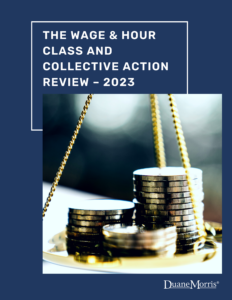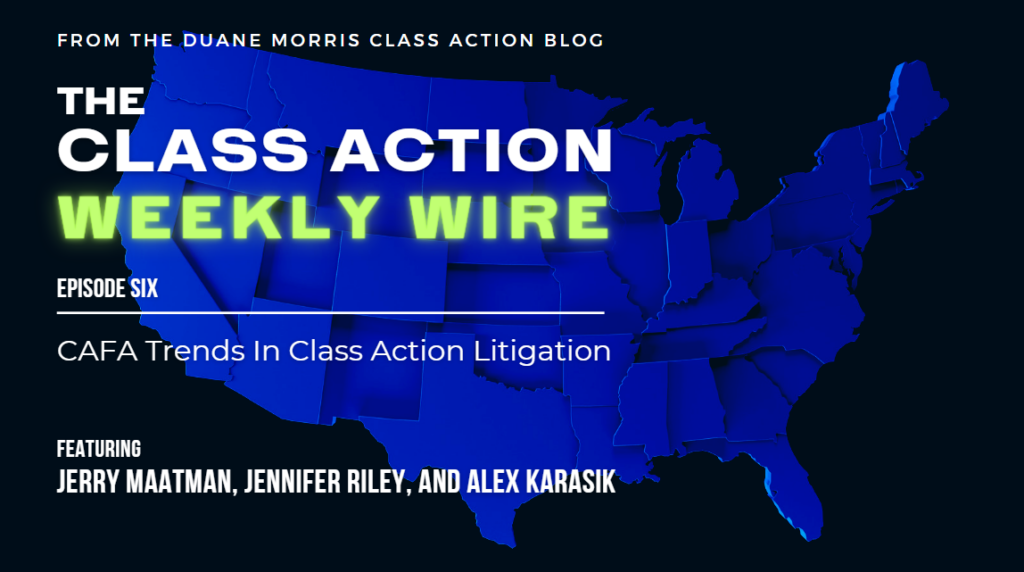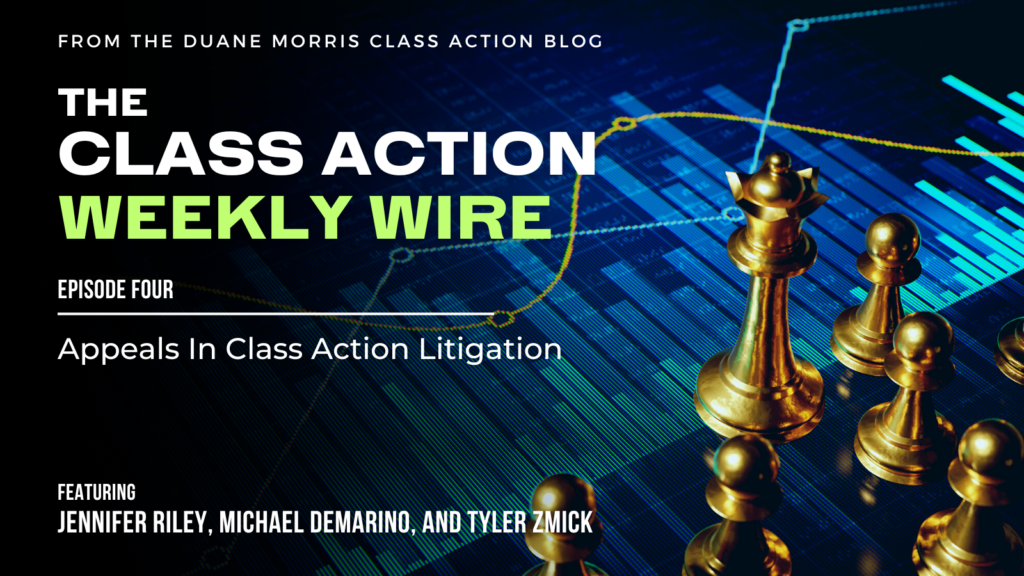Duane Morris Takeaway: This week’s episode of the Class Action Weekly Wire features Duane Morris partners Jerry Maatman, Jennifer Riley, and Alex Karasik with their analysis of significant rulings and trends in class action litigation under the Class Action Fairness Act of 2005 (“CAFA”). We hope you enjoy it!
Illinois Trial Court Grants Class Certification In BIPA Class Action
 By Alex W. Karasik, Gerald L. Maatman, Jr. and Jennifer A. Riley
By Alex W. Karasik, Gerald L. Maatman, Jr. and Jennifer A. Riley
Takeaways: In Palacios v. H&M Hennes & Mauritz, LP, Case No. 18-CH-16030 (Cir. Ct. Cook County, Ill. Mar. 16, 2023), a state trial court in Illinois granted Plaintiff’s motion for class certification in an Illinois Biometric Information Privacy Act (the “BIPA”) class action. Given the limited jurisprudence in BIPA class action certification rulings, this decision is an important read for corporate counsel, as the ruling likely will be used as a roadmap by the plaintiffs’ bar to support their efforts to certify such classes.
Case Background
Plaintiff alleged that Defendant required him and other employees to scan their fingerprints into a biometric time clock system to record the time they worked, and unlawfully collected, possessed, and transferred their biometric information without consent and without a proper retention and destruction schedule. Plaintiff sought to certify a class of all hourly employees who enrolled in or used Defendant’s timekeeping system while working for Defendant between August 9, 2014, and October 15, 2019.
In terms of the four factors to certify the class – numerosity, adequacy of representation, commonality, and appropriateness – Defendant did not challenge the numerosity factor. However, Defendant challenged the motion for class certification regarding the other three factors.
The Court’s Decision
The Court granted Plaintiff’s motion for class certification. First, the Court held that the named Plaintiff was an adequate class representative. Defendant argued that, based on Plaintiff’s deposition testimony, he was, “uninformed and disinterested in the facts, the litigation, and his role as class representative.” The Court rejected this argument, holding that, “while [Plaintiff] may not understand legal jargon . . . he understands the basic facts . . . understands he is making a legal claim for violation privacy rights on behalf of a class of other employees [and] has been in regular communication with his counsel and participated in discovery.” Accordingly, the Court found that Plaintiff would adequately represent the putative class.
Second, the Court held that the commonality factor was met. Defendant contended that Plaintiff was at odds with the rest of the class since he alleged that he suffered emotional distress damages. The Court rejected this argument, holding that Plaintiff testified that he was harmed through a breach of his biometric information privacy rights and was pursuing the same claims on behalf of class members. Accordingly, the Court held that common questions predominated over questions affecting individual class members.
Finally, the Court explained that, “a class action must be an appropriate method for the fair and efficient adjudication of the controversy.” Id. (citations and quotations omitted). The Court opined that many individuals incurred relatively small liquidated damages and their likely recovery was probably too small to justify a separate action. However, collectively, the Court could adjudicate the putative class’s claims, as it noted, “This is what class actions were designed to achieve.” Id. Accordingly, the Court held that a class action was the appropriate method for the fair and efficient adjudication of the controversy.
Implications For Employers
While employers are likely still recovering from the sting of adverse Illinois Supreme Court BIPA class action rulings from early 2023, this decision marks another victory for the plaintiff’s bar. Defendants in BIPA class actions who are facing motions for class certification would be wise to avoid duplicating the arguments made here. In light of the shrinking number of potential BIPA defenses and skyrocketing damages, employers must begin exploring alternative defense strategies to combat these bet-the-company cases.
Illinois Court Dismisses BIPA Class Action Brought Against Seller Of Point-Of-Sale Technology For Lack Of Personal Jurisdiction
 By Gerald L. Maatman, Jr., Tyler Z. Zmick, and Shaina Wolfe
By Gerald L. Maatman, Jr., Tyler Z. Zmick, and Shaina Wolfe
Duane Morris Takeaways: In White v. HungerRush LLC, No. 22-1206 (C.D. Ill. Mar. 28, 2023), the Court dismissed claims for violations of the Biometric Information Privacy Act (“BIPA”) brought against a company that sells point-of-sale technology for lack of personal jurisdiction. White serves as a reminder to businesses that personal jurisdiction in Illinois may be lacking where their conduct has only a tenuous connection to Illinois and/or where they do not “collect” or “possess” biometric data. This ruling – which is largely consistent with federal court decisions addressing the issue – is a rare win for companies facing BIPA class actions, and is a required read for companies facing privacy class action litigation.
Case Background
Plaintiff worked at a restaurant in Peoria, Illinois, which used a point-of-sale system sold by Defendant HungerRush LLC, a Texas-based company. While working at the restaurant, Plaintiff enrolled her fingerprint onto the point-of sale system as a means of clocking in and out of work. She later sued the Texas-based Company, claiming that it violated the BIPA in connection with its sale of the point-of sale system by (i) failing to develop a written policy made available to the public establishing a retention policy and guidelines for destroying biometric data, and (ii) collecting her biometric data without providing her with the requisite notice and obtaining her written consent.
In response to the complaint, the Company moved to dismiss on the basis that the Court lacked personal jurisdiction. In support of its jurisdictional argument, the Company submitted an affidavit signed by its Chief Administrative Officer and General Counsel.
The Company’s affidavit explained that: (i) it is a Texas-based company; (ii) it does not manufacture finger-scan devices or software; (iii) Plaintiff’s employer purchased a point-of-sale system from it and separately purchased a finger-scan device from a third-party; (iv) the finger-scan device operates independently from its software; and (v) finger-scan data is not transmitted to its point-of-sale software – instead, the finger-scan device sends only an approval signal to its software.
Based on these facts, Defendant argued that its limited contact with Illinois (i.e., selling a point-of-sale system to Plaintiff’s Illinois-based employer) was insufficient to establish personal jurisdiction.
The District Court’s Decision
The Court granted the Company’s motion to dismiss under Rule 12(b)(2).
First, the Court noted that “[w]here, as here, the defendant submits ‘evidence opposing the district court’s exercise of personal jurisdiction, the plaintiff must similarly submit affirmative evidence supporting the court’s exercise of jurisdiction.’” The Court explained that because Plaintiff failed to submit any evidence refuting the Company’s evidence, i.e. the sworn affidavit, the affidavit was considered “unrebutted.”
Second, the Court found that the Company’s unrebutted evidence demonstrated that it did not have sufficient minimum contacts with Illinois for this case and it was not reasonably foreseeable that Plaintiff’s claims related to the Company’s contacts with Illinois. Significantly, Plaintiff failed to submit any evidence refuting the affidavit’s sworn statements that Plaintiff’s Illinois-based employer initiated the transaction with the Company, that any contracts the Company makes with Illinois restaurants are made in Texas with Illinois restaurants reaching out to the Company, that the Company’s system has no cloud functions, or that the Company does not and has never manufactured a fingerprint scanner.
The Court held that because Plaintiff failed to offer evidence or adequate explanations refuting the Company’s sworn statements, she failed to meet her burden in establishing personal jurisdiction.
Implications For Employers
White serves as a reminder that companies must have sufficient contacts with the state in order for the courts to have personal jurisdiction over them. In other words, companies with only limited contacts with Illinois will not be subject to personal jurisdiction in courts within Illinois.
White also illustrates the importance of submitting extrinsic materials (e.g., sworn affidavits) in support of showing lack of personal jurisdiction. Significantly, once the defendant has submitted affidavits or other extrinsic evidence supporting lack of jurisdiction, the plaintiff must go beyond the pleadings and submit affirmative evidence supporting the exercise of jurisdiction. Moreover, courts can dismiss BIPA class actions for lack of personal jurisdiction based on supporting affidavits – even where the affidavits speak in part to the merits of the case. See Order & Op. at 8.
Illinois Supreme Court Holds Federal Labor Law Preempts BIPA Claims Asserted By Unionized Employees
By Alex W. Karasik, Tyler Z. Zmick, and Elizabeth C. Mincer
Duane Morris Takeaways: In the Illinois Supreme Court’s latest ruling in the biometric privacy space, it decided in Walton v. Roosevelt University, 2023 IL 128338 (Ill. Mar. 23, 2023), that claims brought under the Biometric Information Privacy Act (“BIPA”) by bargaining unit employees are preempted by Section 301 of the Labor Management Relations Act (“LMRA”) where an employer invokes a broad management rights provision in a CBA. This ruling – which is consistent with federal court decisions addressing the issue – is a rare win for defendants facing BIPA class actions. Employers with unionized workforces may now be able to assert an LMRA preemption defense in seeking dismissal of BIPA claims based on decisions issued by Illinois’s highest state court and the U.S. Court of Appeals for the Seventh Circuit.
Case Background
Plaintiff alleged that when he started working at Roosevelt University in 2018, Roosevelt required him to enroll a scan of his hand geometry onto a biometric timekeeping device as a means of clocking in and out of work. Plaintiff sued Roosevelt the following year, alleging that the university violated Sections 15(a), 15(b), and 15(d) of the BIPA in connection with Roosevelt’s use of the timekeeping system by (i) failing to develop a written policy made available to the public establishing a retention policy and guidelines for destroying biometric data, (ii) collecting his biometric data without providing him with the requisite notice and obtaining his written consent, and (iii) disclosing his biometric data without consent.
In response to the complaint, Roosevelt moved to dismiss on the basis that Plaintiff’s claims were preempted by Section 301 of the Labor Management Relations Act (“LMRA”). Specifically, Roosevelt argued that Plaintiff had been a union member while employed by Roosevelt, and the collective bargaining agreement (“CBA”) between Roosevelt and Plaintiff’s union contained a management rights clause broad enough to cover the manner by which union employees clocked in and out of work. As support, Roosevelt cited the U.S. Court of Appeals for the Seventh Circuit’s decision in Miller v. Southwest Airlines Co., 926 F.3d 898 (7th Cir. 2019), which held that federal labor law preempts BIPA claims when the claims require interpretation or administration of a CBA.
The Cook County Circuit Court rejected Roosevelt’s LMRA preemption argument, finding Miller distinguishable and holding that BIPA claims are “not intertwined with or dependent substantially upon consideration” of terms of a CBA because a person’s rights under the BIPA “exist independently of both employment and any given CBA.” Id. ¶ 6. Because the issue presented a close call, however, the Circuit Court certified the following question for interlocutory appeal: “Does Section 301 of the [LMRA] preempt [BIPA] claims asserted by bargaining unit employees covered by a [CBA]?”
The Illinois Appellate Court answered the certified question “yes.” In doing so, the court noted that the Seventh Circuit had recently come to the same conclusion in a case where “the relevant factual and legal circumstances . . . [were] indistinguishable.” Id. ¶ 8 (citing Fernandez v. Kerry, Inc., 14 F.4th 644 (7th Cir. 2021)). The appellate court determined that Fernandez reached the correct conclusion, as the BIPA “contemplates the role of a collective bargaining unit acting as an intermediary on issues concerning an employee’s biometric information.” Id. ¶ 10 (noting that the BIPA prohibits private entities from collecting biometric information without obtaining consent from the subject or the subject’s legally authorized representative).
The Illinois Supreme Court’s Decision
The Illinois Supreme Court subsequently allowed Plaintiff’s petition for leave to appeal, after which it affirmed the appellate court’s decision. The Supreme Court observed that the Seventh Circuit had twice held that federal law preempts BIPA claims asserted under similar circumstances, and it noted that when interpreting federal statutes, Illinois courts look to the decisions of the U.S. Supreme Court (“SCOTUS”) and federal circuit and district courts. It further noted that the SCOTUS’s interpretation of federal law is binding, and that in the absence of SCOTUS precedent, the weight given to federal circuit and district court interpretations of federal law depends on factors such as uniformity of law and the soundness of the decisions. See id. ¶¶ 23-24 (“[I]f lower federal courts are uniform in their interpretation of a federal statute, this court, in the interest of preserving unity, will give considerable weight to those courts’ interpretations of federal law and find them to be highly persuasive.”).
In comparing Plaintiff’s case to the Seventh Circuit decisions, the Supreme Court acknowledged that the relevant CBA provisions in Plaintiff’s case and in Fernandez both contained similarly broad management rights clauses. See id. ¶ 31 (noting the CBA between Roosevelt and Plaintiff’s union stated that “[s]ubject to the provisions of this Agreement, the Employer shall have the exclusive right to direct the employees covered by this Agreement” and that “[a]mong the exclusive rights of management . . . are: the right to plan, direct, and control all operations performed in the building [and] to direct the working force”).
In sum, because the Supreme Court did not find Miller and Fernandez to be “without logic and reason,” id., it deferred to the uniform federal case law on the issue and held that when an employer invokes a CBA’s broad management rights clause in response to a BIPA claim brought by a bargaining unit employee, the plaintiff’s BIPA claims are preempted by the LMRA.
Implications For Employers
Like the Seventh Circuit’s decisions in Miller and Fernandez, Walton reflects a rare defendant-friendly development and provides a basis for certain employers to seek dismissal of BIPA claims on LMRA preemption grounds. The defense applies only to a subset of employers, however, as it can be asserted only by (i) employers with unionized employees who (ii) have entered into a CBA with a union that contains a management rights clause broad enough to cover the manner by which employees clock in and out of work. Furthermore, unionized employees are not prohibited from seeking redress for alleged BIPA violations – they are simply required to first pursue those claims through the grievance procedures in their CBAs rather than in state or federal court.
Moreover, the National Labor Relations Board (“NLRB”) – the agency that enforces the National Labor Relations Act (“NLRA”) – has indicated that it intends to reshape current law regarding employee privacy and management rights provisions. If such changes take effect, they could reshape how courts assess federal labor law preemption in future BIPA cases.
The Walton ruling highlights the importance of carefully negotiating and drafting CBA provisions, particularly with respect to management rights. Employers in states with strict privacy laws (like the BIPA) should consider contract language that specifically provides management with the right to use and store certain biometric data and/or implement other new technologies.
The Class Action Weekly Wire Podcast – Episode Five
Introducing The Duane Morris Wage & Hour Class And Collective Action Review – 2023
 By Gerald L. Maatman, Jr., Jennifer A. Riley, and Gregory Tsonis
By Gerald L. Maatman, Jr., Jennifer A. Riley, and Gregory Tsonis
Duane Morris Takeaways: Complex wage & hour litigation has long been a focus of the plaintiffs’ class action bar. The relatively low standard by which plaintiffs can achieve conditional certification under the Fair Labor Standards Act (FLSA), often paired with state law wage & hour class claims, offers a potent combination by which plaintiffs can pursue myriad employment claims. To that end, the class action team at Duane Morris is pleased to present the inaugural edition of the Wage & Hour Class And Collective Action Review – 2023. This new publication analyzes the key wage & hour-related rulings and developments in 2022 and the significant legal decisions and trends impacting wage & hour class and collective action litigation for 2023. We hope that companies and employers will benefit from this resource and assist them with their compliance with these evolving laws and standards.
Click here to download a copy of the Wage & Hour Class And Collective Action Review – 2023 eBook.
Stay tuned for more wage & hour class and collective action analysis coming soon on our weekly podcast, the Class Action Weekly Wire.
The Class Action Weekly Wire Podcast – Episode Four
Duane Morris Takeaway: This week on the Weekly Wire podcast, we are pleased to present Duane Morris partners Jennifer Riley and Michael DeMarino and associate Tyler Zmick in our fourth podcast in our series on class action litigation developments. This week’s edition focuses on appeals in class action litigation. We hope you enjoy it!
The EEOC’s 2022 Annual Performance Report Touts $513.7 Million In Worker Recoveries
 By Alex W. Karasik, Gerald L. Maatman, Jr. and Jennifer A. Riley
By Alex W. Karasik, Gerald L. Maatman, Jr. and Jennifer A. Riley
Duane Morris Takeaways: On March 13, 2023, the EEOC published its fiscal year 2022 Annual Performance Report (FY 2022 APR), highlighting the Commission’s recovery of $513.7 million in monetary relief for more than 38,000 victims of employment discrimination, including nearly $40 million as a direct result of litigation resolutions.
This annual publication from the EEOC is noteworthy for employers in terms of recognizing the EEOC’s reach, understanding financial exposure for workplace discrimination claims, and identifying areas where the EEOC may focus its litigation efforts in the coming year. It is a must read for corporate counsel, HR professional, and business leaders.
FY 2022 Statistical Highlights
The EEOC’s recovery of $513.7 million in monetary relief represents a solid increase from the $485 million in monetary relief that it secured in FY 2021. More noteworthy is that the Commission secured monetary relief on behalf of 38,000 alleged victims in FY 2022, which is more than double the amount from FY 2021, when monetary relief was recovered on behalf of 15,000 alleged victims. This suggests that more complainants are being made whole through the EEOC’s litigation and alternative dispute resolution efforts.
Approximately $342 million was recovered for more than 33,298 victims of employment discrimination in the private sector and state and local government workplaces through mediation, conciliation, and settlements. Furthermore, $39.7 million was recovered for 1,461 individuals as a direct result of litigation resolutions. Notably, the EEOC indicated it successfully resolved 44% of its conciliations, and among those successes, 43.1% involved one or more Strategic Enforcement Plan priority areas. The EEOC also conducted 6,578 successful mediations, resulting in $170.4 million in benefits for charging parties.
In terms of charge intake, the EEOC reported 73,485 new discrimination charges, an increase of nearly 20% compared to fiscal year 2021. This statistic suggest workers are increasingly more apt to turn to the Commission to resolve workplace discrimination disputes.
Finally, the EEOC filed 91 lawsuits in FY 2022 on behalf of 53 individuals, including 25 non-systemic suits with multiple victims, and 13 systemic suits involving multiple victims or discriminatory policies. Approximately half of the EEOC’s newly filed lawsuits raised one or more the EEOC’s Strategic Enforcement Plan priorities.
Strategic Priorities
Addressing systemic discrimination has long been a top priority for the EEOC. In FY 2022, the EEOC resolved over 300 systemic investigations on the merits, obtaining more than $29.7 million in monetary benefits. The EEOC also resolved 10 systemic lawsuits, obtaining over $28 million in relief for nearly 1,300 individuals and significant equitable relief. To ensure the systemic lawsuit cupboard was not left bare, the EEOC filed 13 new systemic lawsuits.
Advancing racial justice was another strategic priority for the EEOC in FY 2022. The FY 2022 APR notes that the EEOC resolved 18 lawsuits alleging race or national origin discrimination, for approximately $4.6 million in relief, benefiting 298 individuals. In addition, nine of the new 13 systemic lawsuits include claims of race or national origin discrimination. The EEOC also conducted 468 race and color outreach events, which reached 52,675 attendees. This includes 143 racial justice events reaching 9,064 attendees.
Finally, in recent years the EEOC has indicated that the use of artificial intelligence (“AI”) and algorithmic fairness in employment decisions is a strategic priority. In addition to providing AI training to systemic enforcement teams in the EEOC’s field offices, the EEOC hosted 24 AI and algorithmic fairness outreach events for 1,192 attendees. The EEOC’s efforts culminated with one lawsuit filing in this area. Finally, the EEOC prepared two ADA-related guidance publications relative to the use of artificial intelligence.
Other Notable Developments
Beyond touting its monetary successes, the FY 2022 APR also highlights the EEOC’s efforts in the community. The EEOC conducted 3,302 outreach and training events, providing more than 225,906 individuals nationwide with information about employment discrimination and their rights and responsibilities in the workplace. Among these outreach programs were 399 events for small businesses, which were attend by approximately 18,878 individuals. Finally, 369 outreach events concerned the intersection of COVID-19 and employment discrimination laws. These COVID-19 programs had 26,041 attendees.
The EEOC also expanded its digital footprint, as the EEOC’s website had 10.8 million users. This marks a 3% increase over fiscal year 2021. There were 16 million user sessions, a 4.4% increase over fiscal year 2021. The EEOC had over 29 million page views, a 4.4% increase over fiscal year 2021, and there was a 3% increase in mobile traffic on the website. This data suggests that potential charging parties and other various constituents are more actively engaging with the Commission through its online platforms.
Takeaways For Employers
While the 2020 global pandemic may have slowed down the workforce developments and relatedly the EEOC for a few years, the FY 2022 APR suggests the EEOC is back to investigating and litigating employment discrimination claims in full gear. Employers should be mindful of these data points in terms of implementing and enforcing policies against employment discrimination.
We anticipate that the EEOC will continue to aggressively pursue its strategic priority areas, such as systemic discrimination, racial justice, artificial intelligence, and its underlying goal of providing access to justice for underrepresented groups of workers. We will continue to track EEOC litigation developments throughout the year.



